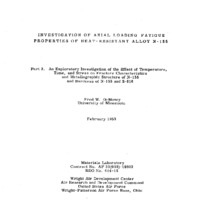-
Title
-
Investigation Of Axial Loading Fatigue Properties Of Heat Resistant Alloy N-155 Part 2. An Exploratory Investigation Of The Effect Of Temperature, Time, And Stress On Fracture Characteristics And Metallographic Structure Of N-155 And Hardness Of N-155 And
-
Date
-
1953
-
Index Abstract
-
Online
-
Photo Quality
-
Complete
-
Report Number
-
WADC TR 52-226 Part 2
-
Corporate Author
-
University Of Minnesota
-
Laboratory
-
Materials Laboratory
-
Extent
-
41
-
PB Number
-
PB116828
-
NTRL Accession Number
-
AD016377
-
Identifier
-
AD0016377
-
AD Number
-
16377
-
Access Rights
-
Notice(s)
-
Distribution Classification
-
1
-
Contract
-
AF 33(038)-18903
-
DoD Project
-
None Given
-
DoD Task
-
None Given
-
DTIC Record Exists
-
Yes
-
Distribution Change Authority Correspondence
-
AFAL LTR
-
Distribution Change Action Date
-
1/1/1900
-
Distribution Conflict
-
Fix
-
Index Price
-
$2.75
-
Index In
-
U.S. Government Research Reports, vol. 23, no. 5, p.174-175, 5/20/1955
-
Abstract
-
Microscopic analysis of the fracture profiles of N-155 specimens indicated that the tendency for an intercrystalline fracture to occur increased with time and decreased with increasing stress and stress ratio. Investigation of the metallographic structure and hardness of unstressed N-155 material exposed to 1350 deg and 1500 deg F for various lengths of time from 4 to 4000 hr disclosed a precipitation hardening as an important structural transformation. Hardness measurements confirmed this conclusion. The effect of stress and stress ratio on the metallographic structure and hardness was investigated. Stress appeared to exert a more pronounced effect on hardness than on metallographic structure; cyclic stress did not significantly accelerate the microscopically visible general matrix precipitate. Rockwell B hardness tests were conducted on both the surface and longitudinal sections of the stressed specimens in the longitudinal variable stress regions. The N-155 as well as the S-816 specimens displayed a hardening effect which increased with increasing stress and appeared to reach a maximum. Tukon Vickers diamond-pyramid hardness tests were also conducted on transverse sections of rotating beam fatigue specimens in the transverse variable stress regions. (See also AD-13052)
-
Report Availability
-
Full text available
-
Date Issued
-
1953-02
-
Provenance
-
IIT
-
Type
-
report
-
Format
-
1 online resource
-
Creator
-
De Money, Fred W.
 WADCTR52-226part02.pdf
WADCTR52-226part02.pdf